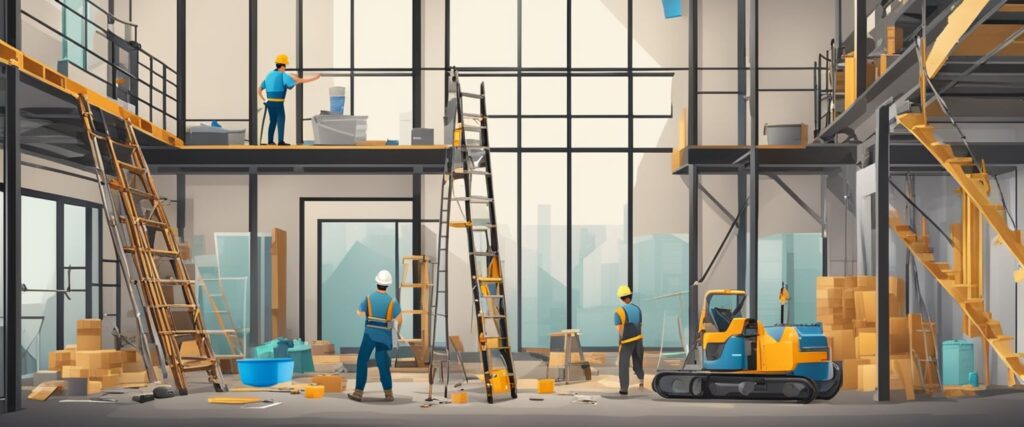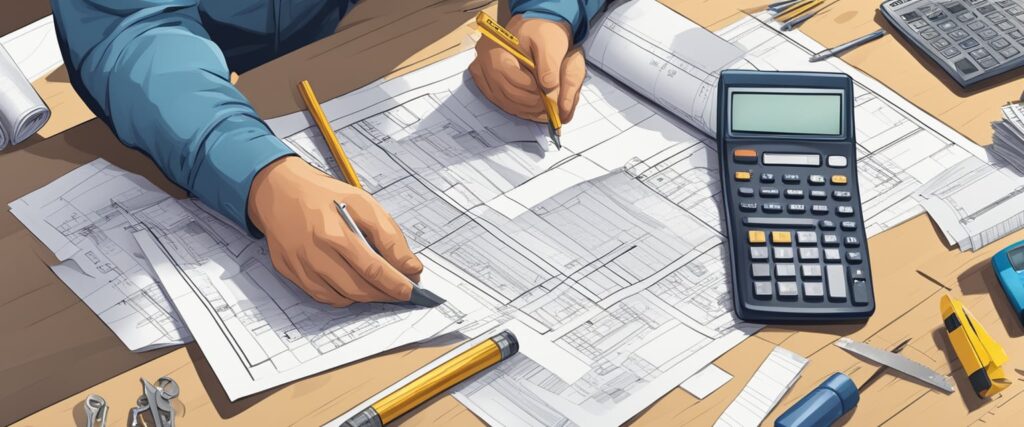Home Renovation Contractors


Expert Tips for a Successful Project
Renovating your home can be an exciting and significant project, but it requires careful planning and selecting the right professionals. Choosing the right home renovation contractor is crucial for a successful renovation. Whether you are updating a kitchen, renovating a bathroom, or undertaking a whole house remodel, working with experienced contractors can make a huge difference.
New York City offers a range of contractor options, from local businesses like Turnkey to specialized services in areas like kitchen and bathroom remodels. These professionals can handle everything from design to build, ensuring your project adheres to local building codes and meets your expectations.
Before undertaking any renovation project, it’s crucial to do your homework. Reliable contractors should have strong reviews, such as those found on platforms like Houzz, and offer comprehensive services ranging from initial consultation to the final walkthrough. Carefully considering these aspects will help ensure your renovation goes smoothly and results in the home of your dreams.
Key Takeaways
- Selecting the right contractor is essential for a successful renovation.
- Experienced contractors ensure projects meet design expectations and codes.
- Careful planning and review of contractor options can smooth the renovation process.
Understanding Home Renovation
When starting a home renovation, it’s vital to understand the foundational principles and the range of projects that can be undertaken. This knowledge can help homeowners make informed decisions and ensure successful outcomes.

The Basics of Home Renovation
Home renovation involves updating, repairing, or enhancing various aspects of a home. This can range from minor repairs to major structural changes. Planning is crucial. Create a detailed plan, including a budget and timeline. It’s important to identify the scope of the project and prioritize tasks. Homeowners often consult with professionals to establish realistic goals.
Design and material selection are also key components. Choosing the right materials and designs that align with the homeowner’s vision and needs ensures satisfaction with the end result. Obtaining proper permits and inspections may be necessary, depending on the project’s complexity.
Different Types of Renovations
Renovations can be classified into several categories. Cosmetic renovations involve changes that improve the appearance of a home, such as painting, flooring, or new fixtures. These are typically simpler and less expensive.
Structural renovations deal with the fundamental framework of the home, like foundation repairs, roof replacements, and room additions. These are usually more complex and costly.
Energy-efficient renovations aim to make homes more environmentally friendly and cost-efficient. Projects might include installing solar panels, upgrading insulation, or replacing old windows with energy-efficient ones.
Lifestyle renovations cater to specific needs or preferences. Examples include creating a home office, building a gym, or setting up an entertainment room. These changes often personalize the space to better suit the homeowner’s lifestyle.
By understanding these types, homeowners can select projects that align with their goals and budgets more effectively.
Planning Your Renovation Project
Proper planning sets the foundation for a successful home renovation. Key elements include setting a budget, considering design and architecture, and determining the scope of the project.
Setting a Budget
Creating a budget is essential. First, decide how much you can afford. Take into account costs for materials, labor, and permits. As a rule of thumb, add an extra 10% to cover unforeseen expenses.
- Review Financing Options: Depending on the project size and your home equity, consider different financing methods. Learn more about these options using a comprehensive guide on financing.
- Prioritize Needs vs. Wants: Focus on must-haves first. Make a list to ensure essential aspects are covered.
Get Multiple Estimates: Request quotes from several contractors. This helps you understand market rates and prevents overpaying.
Design and Architecture Considerations
Design and architecture play a critical role. Collaborate with an architect if your renovation involves structural changes. This ensures safety and compliance with local building codes.
- Functionality: Think about how the space will be used. Functional design should match daily activities and lifestyle.
- Aesthetics: Your renovation should reflect your personal style. Choose colors, materials, and fixtures that match your taste.
- Sustainability: Consider eco-friendly materials and energy-efficient designs. These choices can reduce long-term costs and environmental impact.
For deeper insights, check out some effective planning tips.
Determining the Scope of Your Project
Defining the project scope helps manage costs and timelines. Start by identifying the main goals and specific tasks required.
- Assess Needs: Which areas need attention? Whether it’s a single room or the entire home, clarity is key.
- Create a Timeline: Develop a realistic schedule by consulting with your contractor. A detailed timeline helps in tracking progress and ensuring timely completion. Refer to detailed renovation plans for guidance.
- Permit Requirements: Check if permits are needed for your project. This is crucial for any significant structural changes.
Splitting the project into manageable phases can also help keep things organized. Always keep an eye on how each decision impacts the overall timeline and budget.
Choosing the Right Contractor
Selecting the proper contractor involves evaluating their experience, confirming their licensing and insurance, and checking references. These steps ensure you get reliable and quality construction services.
Evaluating Potential Contractors
Start by listing potential contractors. Seek recommendations from friends and family to ensure they have had positive experiences. Check online reviews and visit websites like the Better Business Bureau for ratings.
Interview multiple contractors. Ask about their experience with similar projects. Ensure they are specialized in the type of renovation you need. Discuss project timelines, costs, and the scope of work.
Verify that the contractor has a clear communication style. They should provide detailed bids and be willing to answer questions. It’s essential to feel confident in their ability to complete the job efficiently and to your satisfaction.
Understanding Licensing and Insurance
Verify that the contractor is licensed and insured. Licensing ensures they meet local regulations and standards. Each state has different requirements, so check local guidelines for specifics.
Confirm that the contractor has adequate insurance. This should include liability insurance to cover damages during the project and worker’s compensation insurance for any potential injuries on site. A licensed and insured contractor protects you from legal and financial liabilities.
Ask for proof of both licensing and insurance before signing a contract. Legitimate contractors will be willing to provide this documentation. If a contractor hesitates, it’s a red flag.
The Importance of References
Request references from recent clients. A reputable contractor will have positive references who can speak to their quality of work and reliability.
Contact these references and ask detailed questions about their experience. Inquire about the contractor’s punctuality, communication, and how issues were handled. Did the project stay within budget and time frame?
Also, visit past projects if possible. Seeing the quality of work firsthand can provide assurance. Reliable contractors should have a portfolio or be able to show examples of their completed projects. This step helps you make an informed decision based on the contractor’s track record.
Legal and Contractual Considerations
When hiring a home renovation contractor, several legal and contractual aspects must be addressed to avoid potential issues and ensure a smooth renovation process. It’s crucial to understand contracts, local building codes, and the necessary permits and licenses.
Navigating Contracts
Contracts spell out the specific details of the renovation. Important elements include scope of work, estimated costs, timelines, and payment schedules. Clear definition of these terms can prevent misunderstandings. Including clauses for termination based on performance and a deposit escrow clause, where an independent third party holds payment until milestones are met, can protect both parties’ interests. For additional insights on essential contract elements, visit Angi’s guide.
Compliance with Local Building Codes
Ensuring compliance with local building codes is critical. These codes regulate aspects like structural integrity, safety standards, and energy efficiency. Violations can lead to fines or project delays. Contractors should be well-versed in local regulations and coordinate inspections as required. This ensures that the renovation meets community standards and legal requirements, minimizing issues during and after the project.
Permits and Licensing Laws
Securing the necessary permits and adhering to licensing laws is vital for any renovation project. Permits may be required for various aspects, such as electrical work, plumbing, and structural changes. Contractors must be licensed and insured, ensuring they are qualified to perform the work. This not only adheres to legal standards but also provides homeowners with peace of mind.

Construction Process
The construction process of a home renovation project involves various stages, including managing subcontractors, setting timelines and milestones, and handling inevitable delays. Effective management in each area is key to the success of the project.
Managing Subcontractors
Subcontractors play a critical role in the construction process. They specialize in various trades such as plumbing, electrical work, and carpentry. A general contractor often hires these specialists to handle specific parts of the project.
Communication is vital when managing subcontractors. Clear instructions and expectations help to avoid misunderstandings. Regular meetings can keep everyone on the same page and ensure that the project stays on track.
It’s also important to verify the credentials and previous work of subcontractors. This ensures they have the necessary skills and experience. Paying them promptly and providing a safe working environment can also improve their performance and efficiency.
Timelines and Milestones
Setting a detailed timeline with specific milestones is essential for a smooth construction process. A timeline helps to organize the project by breaking it down into manageable parts.
Each milestone represents a significant achievement in the project, such as completing the foundation or installing the roof. These milestones help in monitoring progress and identifying any potential issues early on.
The timeline should also include buffer periods for unexpected delays. It should be flexible to accommodate changes without causing major disruptions. Regularly reviewing the timeline helps ensure that the project remains on schedule.
Handling Delays
Delays are inevitable in any construction project. Weather conditions, supply chain issues, or unforeseen structural problems can all cause delays.
To handle delays effectively, it’s important to have a contingency plan in place. This plan should outline steps to take in various scenarios, such as finding alternative suppliers or rescheduling certain tasks.
Communication with the client is crucial when delays occur. Keeping them informed and explaining the reasons for delays can help manage expectations. Adjusting the timeline and reassigning tasks can also help mitigate the impact of delays on the overall project.
By addressing potential delays proactively, the construction process can continue smoothly, ensuring a successful home renovation.
Specific Renovation Considerations
When planning specific renovations, it’s essential to focus on the unique needs of each space whether it’s a kitchen, bathroom, adding a room, or enhancing curb appeal. Each area has its own set of important factors that should be thoughtfully addressed.

Kitchen Renovations
Kitchen renovations can significantly increase a home’s value. Key elements include updating appliances, cabinetry, and countertops. Opt for energy-efficient appliances to save on utility bills. Quartz or granite countertops are durable and attractive choices.
Consider the kitchen layout; an open-concept design can make the space feel larger. Updating the flooring and lighting can also dramatically impact the room’s aesthetics. Adequate task lighting, such as under-cabinet lighting, is crucial for cooking and food prep areas.
Plumbing needs are another consideration. Installing a new sink or dishwasher may require updates to existing plumbing systems. Make sure these updates comply with local building codes.
Bathroom Upgrades
Upgrading a bathroom can greatly improve both functionality and comfort. Installing new fixtures like faucets, showerheads, and toilets can decrease water usage and modernize the look. Choose materials that can handle high humidity, such as tile flooring and water-resistant drywall.
Lighting is another critical factor. Good lighting around the mirror and throughout the bathroom can enhance the space and make daily routines easier. Consider adding a ventilation system if one is not already in place to prevent mold and mildew.
Updating cabinetry and countertops can also make a big difference. Consider storage solutions like medicine cabinets or under-sink organizers to maximize space efficiently.
Adding Rooms and Expanding Space
Adding new rooms or expanding existing spaces can provide much-needed extra square footage. Before starting, ensure the new addition complies with local building codes and obtain the necessary permits.
When adding a room, consider the room’s purpose. For example, an extra bedroom may need closets and windows for natural light. It’s essential to integrate the new room seamlessly with the rest of the house in terms of design and flooring choices.
Expanding space might include extending a living area or adding a second story. Make sure to evaluate the foundation and structural integrity to support the new addition. Hiring a professional contractor with experience in room additions can help avoid common pitfalls.
Exterior and Curb Appeal Work
Boosting curb appeal enhances a property’s value and charm. Focus on landscaping, painting, and updating the front entryway. A fresh coat of paint can revive a tired exterior, and new landscaping can create a welcoming environment.
Replace old windows and doors for improved energy efficiency and aesthetics. Adding features like porch lights or a new mailbox can make a big difference with minimal investment.
Consider the driveway and walkways. Resurfacing or repaving these areas can greatly improve the overall look and safety of the exterior. Don’t forget about the roof and gutters; ensuring they are in good condition is crucial for the home’s structural health.

FINISHING TOUCHES AND POST-RENOVATION
The final stage of a home renovation includes adding finishing touches and conducting a thorough cleanup. These steps are crucial for transforming a newly renovated space into a comfortable and functional living area.
Interior Design and Décor
Interior design plays a significant role in the final look of a renovated home. Stylish elements like new cabinets, elegant countertops, and updated flooring make a big impact. High-quality materials are essential for these components to ensure durability and aesthetic appeal.
Cabinets can be customized to match the overall theme of the home. Whether choosing wood, glass-front, or metal, the right cabinets enhance both the look and functionality of the kitchen or bathroom. Countertops should be selected based on use. Granite, quartz, and marble are popular for their durability and classic look.
For flooring, choices range from hardwood and tile to laminate and vinyl. Each type of flooring offers different benefits like ease of maintenance and resistance to wear. Paying attention to these details can elevate the space significantly.
Post-Renovation Cleanup
Once the design elements are in place, it’s important to focus on cleanup to remove any construction debris. Dust and debris removal is essential for maintaining the new elements installed during the renovation, like cabinets and flooring.
Start by cleaning all surfaces, including walls, floors, and countertops, to eliminate construction dust. Using the right cleaning supplies and techniques prevents damage. Pay attention to corners and hidden areas where dust might accumulate.
Proper disposal of leftover materials is also crucial. This step ensures a clutter-free environment and showcases the renovated space at its best. Regular maintenance is key to keeping the area clean and presentable post-renovation.
Maintenance and Upkeep
After completing a home renovation project, regular maintenance and planning for future remodels is crucial. Keeping the home in top shape and staying ahead of potential issues ensures long-lasting comfort and value.

Regular Maintenance after Renovation
Maintaining a newly renovated home involves regular inspections and touch-ups. Check for any signs of wear and tear, such as cracks in walls or loose fixtures. Address minor issues early to prevent them from becoming costly problems.
Seasonal maintenance is also important. Ensure heating and cooling systems are serviced. Clean gutters and check roofing for potential leaks. This kind of regular care helps prolong the life of renovations and keeps the home in good condition.
Task lists or schedules can help homeowners stay on top of maintenance duties. Keeping a log of completed tasks provides a reference for future work and ensures nothing is overlooked.
Future Remodel Prospects
Planning for future remodels involves understanding the current home’s needs and setting priorities. Identify areas that may need updates in the coming years and consider how these changes can enhance the home’s functionality or value.
Budgeting ahead of time is essential. Saving for future projects and researching potential costs can prevent financial strain and allow homeowners to plan efficiently. By staying informed about trends and new materials, homeowners can make informed choices that fit their style and budget.
Consulting with professionals, like those at Turnkey, can provide insights and help plan for future enhancements. Regularly reassessing the home and updating the renovation plans ensures the property remains modern and well-maintained.

Professional Services and Support
Hiring the right professionals can make a significant difference in the quality and efficiency of your home renovation project. Experts such as general contractors and construction consultants provide specialized knowledge and skills.
When to Hire a General Contractor
A general contractor is essential for large-scale projects. They manage the entire renovation, from planning to execution. For projects that involve structural changes—like adding rooms or removing walls—a general contractor’s expertise is invaluable.
General contractors coordinate with various professionals such as electricians, plumbers, and carpenters. This ensures that all aspects of the project are aligned. They handle permitting and inspections, which saves homeowners time and effort.
When you’re considering hiring a general contractor, look for ones with a strong reputation and verified reviews. You can find professionals through Local Pros who manage extensive home improvement projects.
Consulting Construction Experts
Construction experts offer valuable advice and technical support. They can guide you through complex decisions like materials selection and spatial planning. Consulting with an expert early on helps avoid costly mistakes and ensures that the project meets building codes and regulations.
These professionals also provide online consultations, making it easy to get advice without site visits. For example,Turnkey offers such services and comes highly rated.
Consulting with experts can be particularly beneficial when dealing with specialized tasks such as acoustics or exterior insulation. Engaging with the right Expert can save money and time in the long run.
Sustainable Renovation Practices
Sustainable renovation practices help improve a home’s efficiency and reduce its environmental impact. These practices focus on energy conservation, waste reduction, and using eco-friendly materials.

Energy efficiency is a key aspect. Upgrading to energy-efficient HVAC systems can lower energy consumption. Similarly, using energy-efficient windows and doors helps improve insulation and reduces drafts. These upgrades can significantly cut down on utility bills.
Using sustainable materials like reclaimed wood, bamboo, or recycled metal is also crucial. These materials lessen the need for new resources and are often more durable than traditional options.
Incorporating water-saving fixtures, such as low-flow toilets and faucets, reduces water usage. Managing water efficiently is important for both environmental and economic reasons.
To minimize waste, homeowners can donate leftover materials like paint, tiles, and fabric to schools or community centers. This practice not only reduces landfill waste but also benefits local organizations.
Solar panels are another effective sustainable renovation choice. They provide clean energy and can reduce reliance on non-renewable sources, contributing to a lower carbon footprint.
Using eco-friendly paints and finishes is important for maintaining indoor air quality. Products with low or no volatile organic compounds (VOCs) are healthier for the home’s inhabitants.
Implementing smart home technology helps monitor and manage energy use. Smart thermostats, lighting, and appliances can optimize energy consumption and offer convenience.

Financial Aspects and ROI
When planning home renovations, financial considerations are crucial. Establishing a budget ensures that the project remains financially feasible. It’s important to consider various financing options such as personal loans, home equity loans, or even refinancing.
Timing can also affect costs. Renovating during contractors’ off-seasons can lead to better deals. Tackling some DIY tasks may reduce labor expenses.
Different renovations offer varying Returns on Investment (ROI). Some projects have higher returns than others.
Here is a brief look at potential ROI for common renovations:
| Renovation Type | Average Cost | Average Resale Value | ROI |
|---|---|---|---|
| HVAC Electrification | $17,747 | $18,366 | 103% |
| Basic Kitchen Remodel | Varies by location | Increases significantly | ~70-80% |
| Full-Home Renovation | ~ $105 per sq ft | Market dependent | Variable |
It’s critical to choose projects that align with both budget and potential ROI. Projects like minor kitchen remodels or energy-efficient upgrades tend to offer better returns. Investing in home improvements can be financially rewarding. Prioritizing projects with high ROI will help maximize gains when selling the property.
Frequently Asked Questions
Choosing the right home renovation contractor involves considering several key factors. It’s important to verify their licensing, set a budget, understand the difference between contractor types, communicate your ideas, and review the contract carefully.
Look for experience and reputation. Check online reviews and ask for references. Ensure the contractor has completed similar projects. Get detailed quotes from multiple contractors. Compare their timelines and costs.
Request to see the contractor’s license and insurance certificates. Verify the license with local licensing authorities. Ensure the insurance policy covers both workers’ compensation and liability. This protects you in case of accidents or damage.
Get multiple quotes to understand the cost range. Include a contingency fund for unexpected expenses. Prioritize your needs over wants. Track all expenses carefully. Consider different financing options if necessary to manage cash flow.
A general contractor manages all aspects of a project, including hiring subcontractors for specialized work. A remodeling contractor focuses on renovating specific areas like kitchens or bathrooms. Both coordinate the project but may specialize in different types of work.
Use visual aids like sketches, photos, or design software. Schedule regular meetings to discuss progress. Be clear and specific about your goals and preferences. Keep a written record of all communications to avoid misunderstandings.
The contract should detail the scope of work, timeline, and payment schedule. Include specifics on materials, brands, and finishes. Ensure there are clauses for changes and unforeseen issues. Both parties should sign and date the document.



